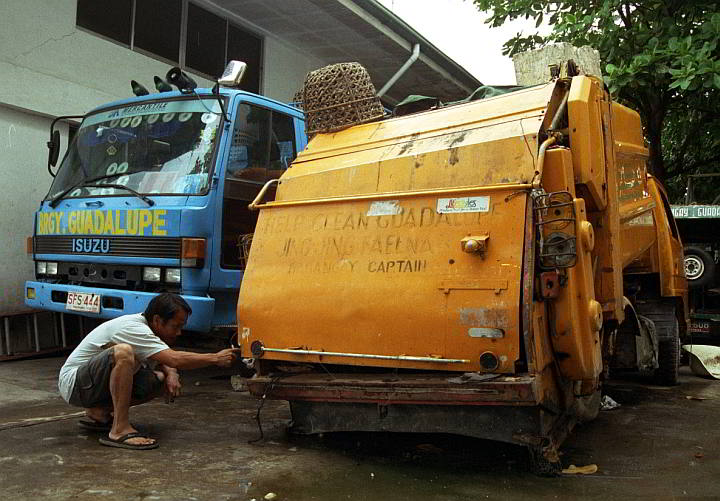
OPLAN BAYANIHAN. Not all barangays in south Cebu City have enough trucks to collect garbage from neighborhoods and haul them to the landfill in Consolacion town. Some trucks are no longer roadworthy. Picture used for illustrative purpose.
(CDN FILE PHOTO)
Barangay captains in Cebu City’s south district yesterday agreed to help each other by clustering garbage collection and lending resources to villages with no trucks to haul trash.
Joel Garganera, chairman of barangay Tinago and vice president of the city’s Association of Barangay Councils (ABC), yesterday said this agreement was reached during a closed-door meeting.
Problems of garbage collection worsened after the overused Inayawan landfill was permanently closed in mid-January by Mayor Michael Rama, forcing the city’s 80 barangays to transport their own trash to a landfill in Consolacion town in north Cebu when several villages lack trucks or have broken-down units.
“With the lack of garbage trucks, adjacent barangays should do clustering. Some barangays agreed to schedule their collection in order to be able to lend their trucks to other barangays. Magtinabangay gyud mi ani (We really have to help each other),” Garganera told Cebu Daily News.
North district barangays are less affected than those in the south due to their proximity to Consolacion town. The additional influx of trucks going to Consolacion has resulted in traffic congestion in roads leading to the town.
“Most of us can only do one trip a day,” said Garganera. Some trucks met accidents like the one from barangays Poblacion Pardo and Ermita which conked out on the way to the steep landfill in Consolacion.
As a temporary measure, the Cebu City Solid Waste Management Board will rent 10-wheeler trucks to haul garbage collected from the south district, the board’s head, Jade Ponce, said.
“According to the DPS (Department of Public Service), five more trucks are enough since each can carry 8-10 tons of garbage,” Ponce said.
He said they plan to do a 30-day test run of the additional trucks next week. Barangays will cover the maintenance expenses of the rented trucks.
According to Cebu City Environment and Natural Resources Officer (CCENRO) Randy Navarro, renting trucks will cost the city P1,700 per ton of garbage. The amount was estimated based on their previous experience in renting trucks for garbage collection.
Ponce said they’re also negotiating with the Talisay City Government for an agreement on dumping waste from south barangays in Cebu City to their government-owned and -operated landfill.
He said this will help south barangays since they don’t have to travel to Consolacion to dump their garbage.
Since the closure of the Inayawan Sanitary Landfill last Jan. 15, barangays in the city mostly in the south have been experiencing problems in waste collection and dumping.
Some barangay captains have raised concerns with the closure of the landfill saying that their trucks risk damage from the trip going to the Consolacion landfill, which is uphill, to dump their wastes.
The one in Talisay is located downhill, making it easier for smaller barangay trucks to bring loads of garbage.
Meanwhile, Cebu City Mayor Michael also called the attention of the City Council on the issue of prioritizing the barangays acquiring new garbage trucks using the city’s local development fund.
He said the prerogative to choose the beneficiary barangays should remain with him as mayor.
“What belongs to them, I’ll respect. But what belongs to the executive, they should not encroach,” Rama told reporters yesterday.
In his resolution in November last year, Councilor Eugenio Gabuya Jr. wanted the city government to prioritize 13 barangays. But the mayor returned the resolution saying the mayor should be the one to make the choice.
Councilor Nida Cabrera said households and businesses should religiously segregate their wastes in order not to add to the city’s garbage problem.
“If people segregate, the amount of waste that needs to be collected will be lessened. Plastics and recyclables can be sold,” said Cabrera who heads the committee on environment.